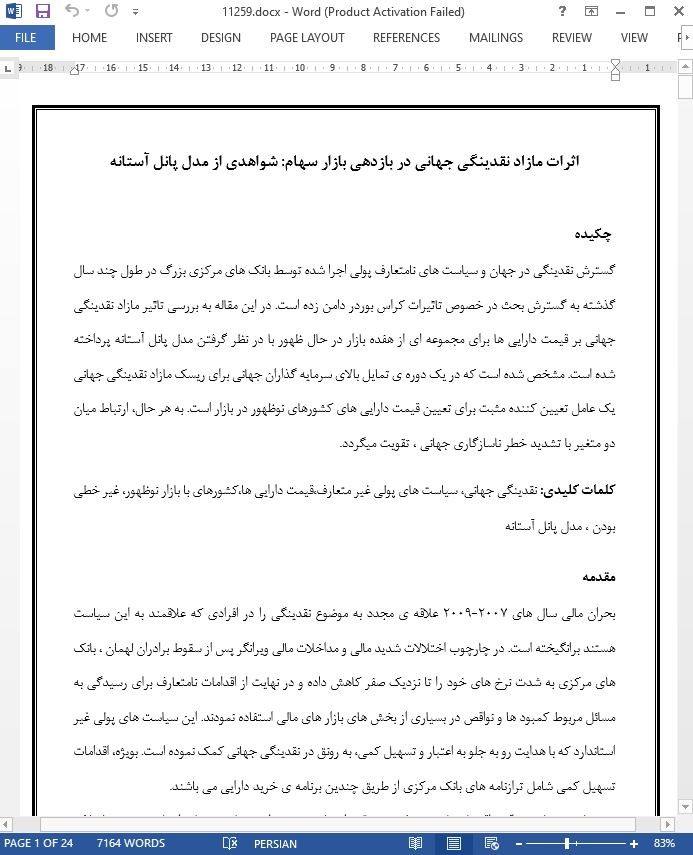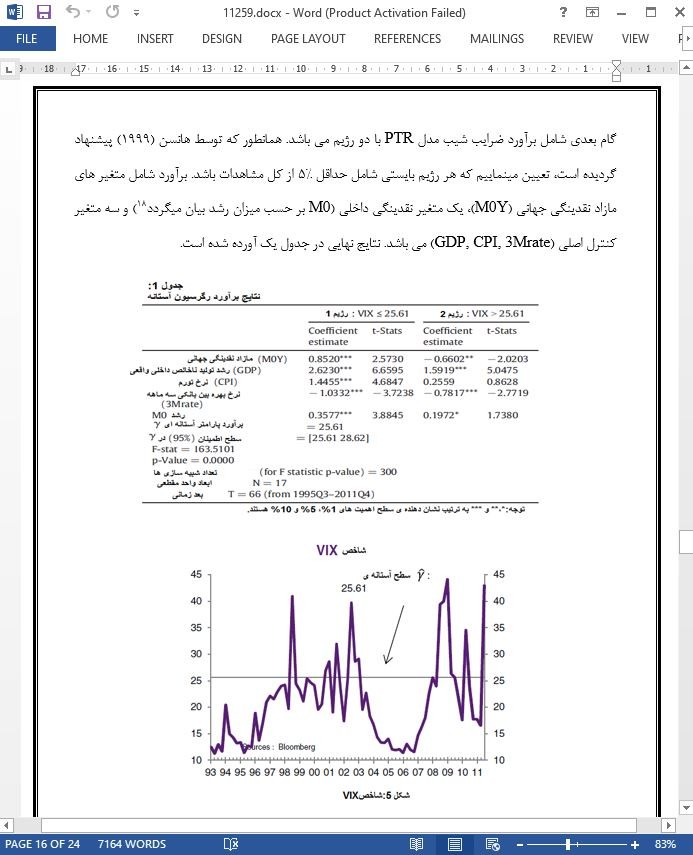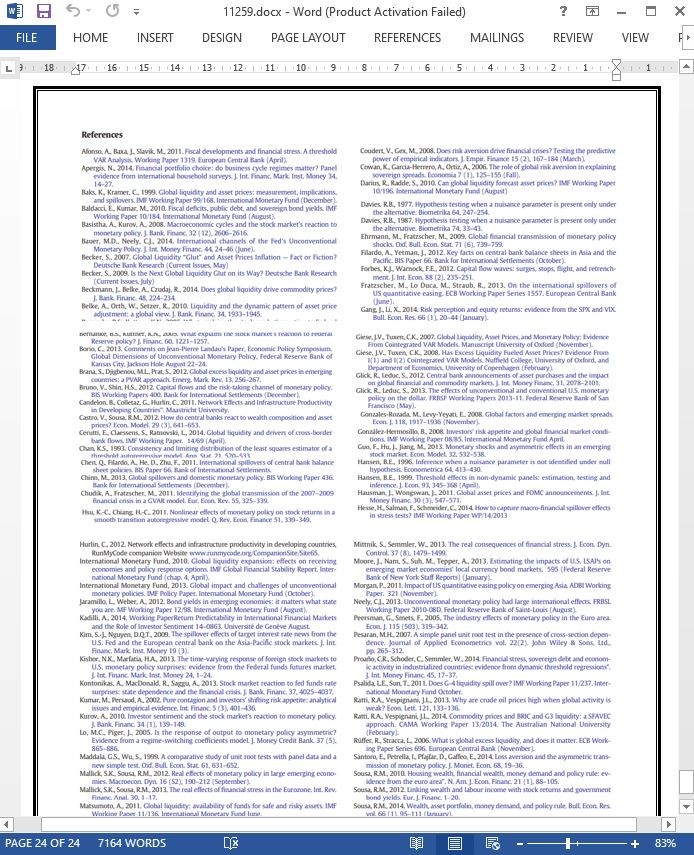
اثرات مازاد نقدینگی جهانی در بازدهی بازار سهام: شواهدی از مدل پانل آستانه
چکیده
گسترش نقدینگی در جهان و سیاست های نامتعارف پولی اجرا شده توسط بانک های مرکزی بزرگ در طول چند سال گذشته به گسترش بحث در خصوص تاثیرات کراس بوردر دامن زده است. در این مقاله به بررسی تاثیر مازاد نقدینگی جهانی بر قیمت دارایی ها برای مجموعه ای از هفده بازار در حال ظهور با در نظر گرفتن مدل پانل آستانه پرداخته شده است. مشخص شده است که در یک دوره ی تمایل بالای سرمایه گذاران جهانی برای ریسک مازاد نقدینگی جهانی یک عامل تعیین کننده مثبت برای تعیین قیمت دارایی های کشورهای نوظهور در بازار است. به هر حال، ارتباط میان دو متغیر با تشدید خطر ناسازگاری جهانی ، تقویت میگردد.
مقدمه
بحران مالی سال های 2007-2009 علاقه ی مجدد به موضوع نقدینگی را در افرادی که علاقمند به این سیاست هستند برانگیخته است. در چارچوب اختلالات شدید مالی و مداخلات مالی ویرانگر پس از سقوط برادران لهمان ، بانک های مرکزی به شدت نرخ های خود را تا نزدیک صفر کاهش داده و در نهایت از اقدامات نامتعارف برای رسیدگی به مسائل مربوط کمبود ها و نواقص در بسیاری از بخش های بازار های مالی استفاده نمودند. این سیاست های پولی غیر استاندارد که با هدایت رو به جلو به اعتبار و تسهیل کمی، به رونق در نقدینگی جهانی کمک نموده است. بویژه، اقدامات تسهیل کمی شامل ترازنامه های بانک مرکزی از طریق چندین برنامه ی خرید دارایی می باشند.
6. نتیجه گیری
مازاد نقدینگی جهانی، که با نسبت پایه ی پولی جهانی به تولید ناخالص داخلی اسمی جهانی نشان داده میشود، به طور پیوسته از اواسط دهه 1990 و قبل از شتاب گرفتن شدید سیاست های پولی غیر متعارف بانک های مرکزی در اقتصاد های پیشرفته در حال افزایش یافتن بوده است. مطالعات اندکی به سرریز نمودن بین المللی این سیاست ها ، بویژه با توجه به تاثیر آنها بر کشورهای با بازارهای نو ظهور پرداخته اند. نتیجه گیری اولیه ای که میتواند از این تحقیقات استخراج گردد، بهمراه رابطه ی مثبت بین نقدینگی و قیمت دارایی ها ، وجود رابطه ی تجربی غیر خطی را محتمل می داند
Abstract
The expansion of global liquidity, exacerbated by the unconventional monetary policies implemented by the major central banks over the past several years, has contributed to the debate on the cross-border impact of those measures. This paper examines the impact of global excess liquidity on asset prices for a set of seventeen emerging market countries taking into account nonlinearity by using a panel threshold model. We find that in a period of global investors' high risk appetites, global excess liquidity is a positive determinant of asset prices in emerging market countries. However, the link between the two variables changes when global risk aversion strengthens.
1. Introduction
The 2007–2009 global financial crisis sparked a renewed interest in the topic of global liquidity by those involved in the policy debate. In the context of severe financial market disruptions and impaired financial intermediation following the Lehman Brothers collapse, central banks aggressively lowered their rates to near zero and ultimately used unconventional measures to address issues related to shortages in many financial market segments. These non-standard monetary policy measures, which ranged from forward guidance to credit and quantitative easing, have contributed to the boom in global liquidity. In particular, quantitative easing measures have consisted of a massive expansion of central bank balance sheets via several asset purchase programs.
6. Concluding remarks
Global excess liquidity, proxied by the ratio of world monetary base to world nominal GDP, increased steadily from the mid-1990s before accelerating sharply because of unconventional monetary policies established by central banks in advanced economies. Only a few studies have focused on the international spillovers of those policies, particularly with respect to their impact on emerging market countries. The primary conclusions that can be drawn from those works are mixed with respect to a positive relationship between liquidity and asset prices, although they do not consider the probable empirical nonlinearities in the relationship.
چکیده
1. مقدمه
2. توصیف داده ها
3. روش مدل پانل آستانه ای
4. ارزیابی نتایج
5. تجزیه و تحلیل ثبات
6. نتیجه گیری
Abstract
1. Introduction
2. Data description
3. The panel threshold model methodology
4. Estimation results
5. Robustness analysis
6. Concluding remarks
- ترجمه فارسی مقاله با فرمت ورد (word) با قابلیت ویرایش، بدون آرم سایت ای ترجمه
- ترجمه فارسی مقاله با فرمت pdf، بدون آرم سایت ای ترجمه



